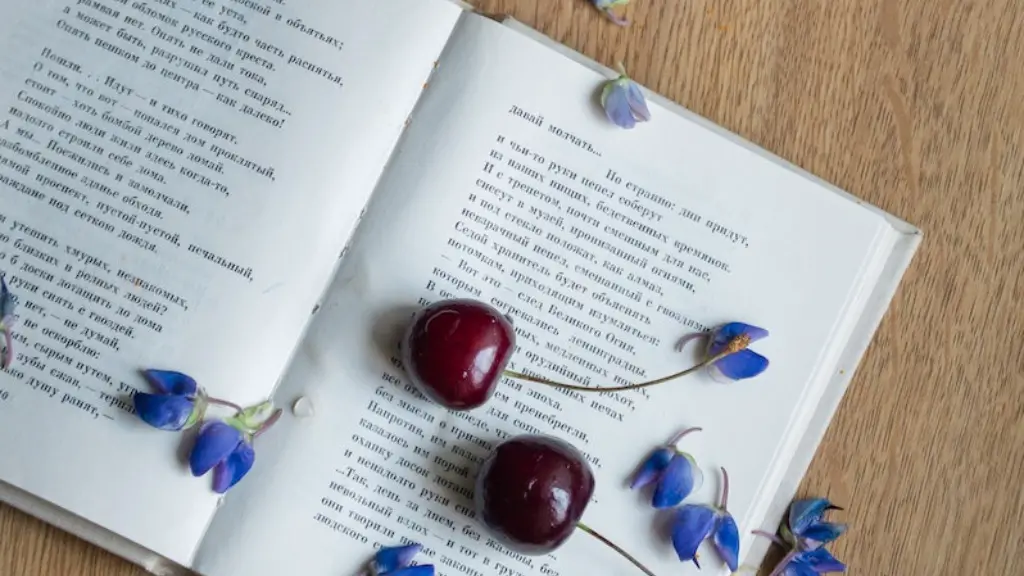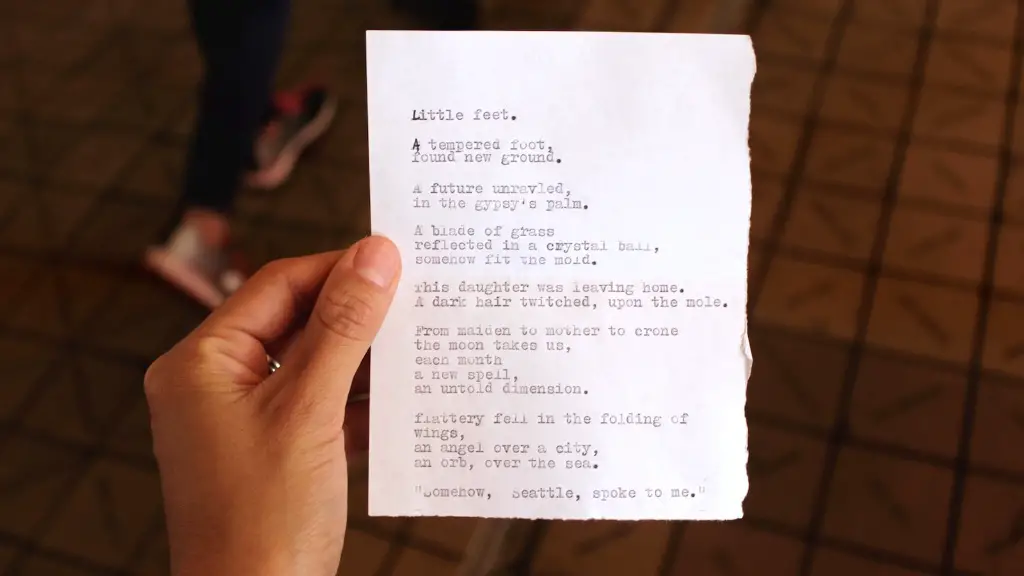What is the definition of a voice in poetry? To answer this question, one must remember that the purpose of poetry is to express and communicate ideas, images and emotions. A poet’s voice is the distinctive quality of their creative expression. It is the way their words sound when read out loud and the manner in which their words convey meaning. As an auditory component of poetry, a poet’s voice helps establish an intimate bond between writer and reader. It is an important element of the poetic process and essential for a successful poem.
When approaching a poem, it is important to pay attention to the language, form, and structure. It is also useful to consider the connotations, imagery and tone. By doing so, the reader can begin to identify the poet’s voice. As well as helping to determine the poem’s intention, it can also reveal the poet’s attitude and individual characteristics.
The poet’s voice can take many forms. It might be evident in the form of humor, a story, imagery, repetition, or any other rhetorical device. The voice in poetry can be passionate and powerful or subtle and subtle. It can also exhibit the poet’s sense of balance and control. All of these features contribute to the poem’s interpretation and overall message.
A poet’s voice can be influenced by their experiences, environment, and cultural background. It can also be shaped by external factors such as social and political issues, historical events and literary trends. In addition, literary styles and movements can play an important role in influencing the poet’s voice.
One way to enhance the poet’s voice is by using descriptive language. Poets use descriptive language to create vivid images and to help readers identify and connect with the poem’s intended message. Descriptive language can also be used to capture the reader’s imagination and to evoke their emotions.
Another technique is to use figural language. Figural language is when the poet uses metaphors, similes, and other figures of speech to compare two seemingly unrelated ideas and to give a more precise meaning to the poem’s content. By using figurative language, a poet can draw on the reader’s preconceived notions and emotions as they interpret the poem, thereby creating a more complete experience.
The most important factor to take in consider when evaluating a poet’s voice is the poet’s personal style. A poem’s success depends less on the poet’s popularity or fame, and more on the poet’s ability to invoke a feeling or understanding with their words. A poem’s strength is in how it speaks to a reader and makes them think, feel and experience the poem without speaking a single word aloud.
How Can Poets Improve Their Voice?
When writing a poem, the poet should first identify the topic and the specific purpose of the poem. Then the poet should consider the audience and intended readership. Is the poem intended to express love or inspire action? Does the poem have a subversive message or does it reflect the poet’s values? Once these questions have been answered, the poet should then consider their style and choose words or devices that fit the poem’s theme. This could include repetition, metaphor and allusion, et cetera.
It is also important for the poet to be aware of any influences that may be present. Poems can be affected by the writer’s cultural background, beliefs and upbringing. Taking an honest look at one’s own writing style, in order to improve and strengthen it, can help the poet communicate ideas more effectively. Moreover, poets should also read and explore a variety of other writing styles to further develop their own unique and powerful voice.
Finally, poets should strive to write in a way that transcends the form and communicates the poem’s underlying meaning. Writing with a clear and authentic voice, a poet can create something that can inspire, educate and engage the reader – regardless of the subject or topic.
How does a poet connect to the audience?
A poet’s voice is ultimately a tool for communication. Through the judicious use of language, a poet can evoke feelings, create an understanding of shared experiences, and spark conversations. By connecting with the reader on a personal level, the poet can encourage critical thinking and inspire empathy. As an audience member, it is important to remember that the poet is conveying a story, an image, or a concept. A poem can help bridge gaps in understanding and spur constructive dialogue.
In order to establish a connection with the audience, poets must make sure to use language that is accessible and relatable. They should also use elements of surprise and ask questions that may challenge the readers to think in new directions. Finally, it is important to choose words that capture the audience’s imagination and make the poem come alive.
In conclusion, understanding the definition of a voice in poetry is essential for a successful poem. Although there is no definitive answer, a poet’s voice should be distinct and powerful. It should be shaped by the poet’s background and experiences, the poem’s topic and audience, and the poet’s skill in selecting the appropriate words. Developing this understanding takes practice, but with dedication and perseverance, a poet can create something truly special.
What strategies can be used to master a poet’s voice?
In order for a poet to master their voice, they must become familiar with the conventions of the poetic form. This can be done by reading other poets’ work, familiarizing oneself with the fundamentals of poetry, and by understanding the importance of making conscious choices when selecting words and literary devices. In addition, poets should experiment with language, inform themselves of various poetic techniques, and explore their own interpretive world.
Finally, poets should strive to make every word count. They must work to avoid cliches and find original ways to express their ideas. They should also strive to hone their craft through practice, constructive feedback and revision. By focusing on the language and trying to capture the essence of their experience, poets can create meaningful and powerful pieces of work that will move their readers.
What are the benefits of understanding a voice in poetry?
Understand the voice in poetry can help readers better appreciate and experience poetry. It enables readers to identify the devices and language used which can give further insight into the poet’s thought process. Besides, understanding the poet’s tone and attitude can also provide an understanding of the poem’s true meaning. Furthermore, by understanding the poet’s use of language, the reader can better connect with the poem and gain a greater appreciation for the beauty and complexity of the form.
Knowing a poet’s voice can also help unlock the opportunity for personal expression. By connecting with the poet’s unique and personal style, the reader can gain confidence to explore their own voice and create their own meanings of the poem. As a result of being able to add one’s own interpretation, the reader becomes more engaged with the poem and can gain a deeper understanding of its message.
In short, understanding a poet’s voice is beneficial for connecting to the poem, gaining a better appreciation for the art form, and unlocking the opportunity for personal expression. By being aware of the language being used, the reader can create a bridge between themselves and the poet and gain a more meaningful experience of the poem.
What are the obstacles to understanding a poet’s voice?
One of the main obstacles to understanding a poet’s voice is language barriers. Even if a poem is written in the same language, cultural and geographical influences can affect the poet’s words, making it difficult for readers who are not familiar with the spoken language to interpret the poem’s intended message. Another obstacle is that some people simply lack the ability to understand poetry due to a lack of experience or knowledge of the subject.
Additionally, the influence of time and genre can also be a hindrance when attempting to craft one’s own voice. As trends and styles are constantly shifting, poets may find themselves struggling to stay abreast of these changes and remain relevant to their readers. This challenge can become amplified when the poet is feeling pressured to conform to certain expected conventions in order to be accepted.
Finally, poets may face obstacles to understanding their own voice. This is due to the fact that writing is often a self-exploratory experience. In some cases, this can lead to confusion or difficulty when attempting to channel one’s personal emotions and create meaningful pieces of work. Moreover, if a poet feels they are restricted by their own skill level, they may lose their confidence and become inhibited.
In conclusion, the obstacles to understanding a poet’s voice can vary and can be both personal and external. Poets should strive to be aware of any potential hindrances and focus on refining their craft in order to produce meaningful and engaging pieces of work.





